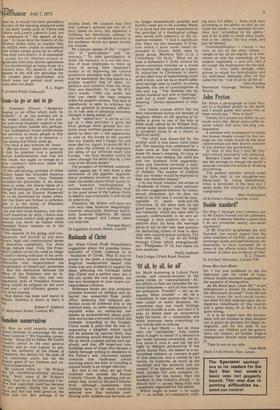icon—to go or not to go
11-: President Nixon's "desperate linging to an office which daily he eakens " is, as you pointed out in st week's editorial, one of the sadest and most shameful aspects of the atergate affair. Sadder still, perhaps, the widespread moral purblindness hat prevents so many people in this ountry — as well as in America — mom seeing that Nixon must go.
The issue is less whether he 'knew' r ' dtd not know' about the cover-up that he presided over a patently orrupt Administration that was not lfly ready, but eager, to renege on a treat country's hard-won ideals for heir own ends.
If the self-serving cynicism of these hodern 'egos has wounded America horally more, even, than Vietnam kounded her physically; if, for many rears to come, the liberal ideals of a eorge Washington, an Abraham Linooln and, yes, an Eleanor Roosevelt ire to be smothered by titters wheniver the Stars and Stripes is unfurled, lhen it is the doing of President liixon's Administration.
As one who loves America, and who 'S half American by birth, I know that lhose wounds (which daily grow more piteous) can never be healed while president Nixon remains on in the White House, The manner of his going, and coniequences, will involve as you have ihown, legal and constitutional issues of draconian complexity. Yet, three things remain clear. First, the President's failure to see the need to resign l$ itself a strong indicator of his unfithess to govern. Second, the formidable difficulties over impeachment are symptomatic of Americans' proneness to blur the distinction between the office of the President and its in°Umbent. Third, the very real con8equential evils of President Nixon's going would be eclipsed by the even loiore real — and infinitely greater — evil of his staying.
„ This lesson has been well learnt in olritain. America is about to learn it teo.
Robert F. Eddison
17, Molyneux Street, London WI












































 Previous page
Previous page